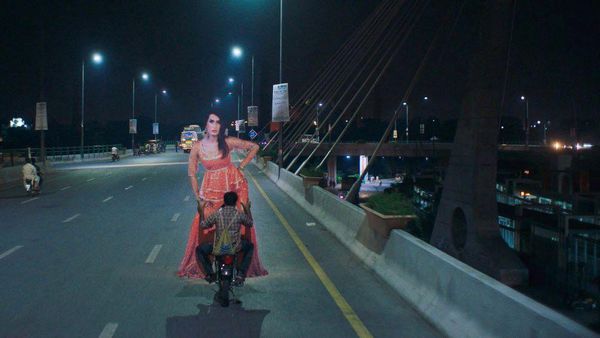Eye For Film >> Movies >> Joyland (2022) Film Review
Joyland
Reviewed by: Amber Wilkinson

Through the course of this ensemble drama from Saim Sadiq a number of serious themes will emerge about the oppression of gender traditions but he displays a lightness of touch that hooks us on gentle observation as we enter the world of a single Pakistani household.
The family is ruled by an ageing widowed patriarch (Salmaan Peerzada), whose opinions of the rest of his brood are generally strict and sour. He reserves particular opprobrium for his youngest son Haider (Ali Junejo), who is more or less functioning as a house husband while his make-up artist wife Mumtaz (Rashi Farooq) goes out to work. While at home Haider cooks, cleans and helps out his older go-getter brother Kaleem (Sohail Sameer) and wife Nucchi (Sarwat Gilani) with their three - and soon to be four - young children.

The preference for boys is accentuated by Kaleem and Nucchi’s hopes for their latest pregnancy but topping off Haider’s failings in his father’s eyes is the fact that he is childless. It’s no wonder then, when Haider finally does get a job, he is less than willing to share what it is with the rest of his clan. That’s because he has, despite having no obvious talent for it, been selected as part of a crew of backing dancers for a trans entertainer at an erotic theatre. Performer Biba (Alina Khan) is everything that Haider isn’t - aloof and assured both at work and in her sense of who she is and what she wants from life. Biba’s strong personality is crucial to the film and Khan - who starred on the short from which this is expanded - brings her talent and confidence home.
Sadiq laces the situation with humour as Haider tells his family he’s a manager at the place, when he’s really bumbling along getting pointers on how to shake his booty for the crowd. Beneath this, however, more serious themes begin to emerge, especially as Haider’s bond with Biba strengthens and he begins an exploration of his own sexuality that proves as clumsy as his dance moves. Sadiq holds his ensemble in careful balance. Although Haider’s secret drives the plot, there’s plenty of room for the lives of the other characters. Mumtaz’s own frustrations are articulated and the relationship between her and her sister-in-law also has room to breathe.
All of this is shot by cinematographer Joe Saade with an emphasis on moments of unexpected warmth, such as a performance lit in impromptu fashion by mobile phones.
It is not so much individual people who cause the problems but rather the constricting cultural circumstances that dictate everyone must play their allocated role. Even Haider’s father finds himself falling foul of the expectations of others after an innocent mistake - and in a move that speaks to the film as a whole, would rather go against his own desires than not fall back into societal line. Higher prices are paid than this in a film in which sadness and loss become all the more profound because of the slow build to them.
Reviewed on: 26 Feb 2023
















